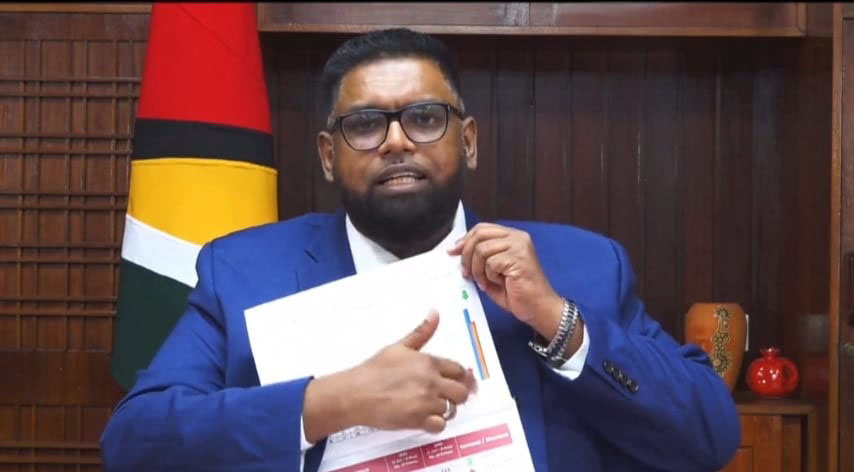Having recognised that the “Safe City” project has yielded results in fighting crime, President Irfaan Ali yesterday announced plans to expand the surveillance programme countrywide.
“…Nationally we are going to have a Safe Country programme. We are going to have the entire country connected on the CCTV cameras so that all of the country will be [under] the watch by the relevant authorities so that we can be proactive in crime fighting,” Ali said yesterday during an address to the nation.
Ali, who is also Commander-in-Chief of the Armed Forces, also said that government will be investing in intelligence gathering by the law enforcement officials. “…You will see more crime being caught even before they were committed or cracked before they were committed because of the proactive work and the intelligence gathering,” Ali noted.
Intelligence gathering, Ali said, must be community-centered. “…Community-oriented, community-supported and we have to develop the trust between the police force and the communities and that is what we are doing. Addressing the issue of trust, bridging that gap, integrating the community in crime fighting, proactively approaching this,” he explained.
In July, 2019, the Huawei-built Safe City Command Centre for the “Safe City” CCTV surveillance system was unveiled under the former David Granger-led APNU+AFC administration.
The Safe City system is made up of 102 Intelligent Video Surveillance sites, each consisting of three to four cameras, the command centre, which will have the capacity for about 25 agents, two systems that can be mounted on vehicles, as well as three different types of radios and body cameras. Several months after, an additional 17 cameras were installed across the country at crucial locations, such as the Stabroek Market, the Berbice River Bridge and the Lusignan prison.
The cameras are equipped with several features, such as video monitoring systems that aid in the deployment and tracking of law enforcement officers, remote tracking, a facial tracking system, a real time facial recognition and a licence plate location history search system.
The system is operational 24-hours per day and monitors sections of Georgetown and the East Bank of Demerara. Among some of the areas are Avenue of the Republic, Water Street, Lombard Street, Brickdam, Lime Street and Croal Street.
The system is a component of the US$36 million National Broad-band Expansion Project (NBEP).
Addressing the crime situation in the country during his address on Friday, Ali said that while there has been an overall decrease in serious crimes, there are still some challenges and government is “still not satisfied”.
As of yesterday, Ali disclosed that the Guyana Police Force (GPF) recorded a 19.4% decrease in serious crimes, when compared to the same period last year.
Ali admitted that there are some areas where the force remains “weak”. “…I am transparent with you. There are some areas that we remain weak and [where] we must build capacity,” he said.
To tackle the issue, Ali said, “incentivising” of the force is being considered whereby those who performed will be rewarded. “…Where there is good performance, there must be differentiated treatment. You must be recognised for good performance. Incentive-based crime fighting,” he said.
Second chance programme
Additionally, he said government is also looking to roll out a programme which will focus on giving a second chance to persons involved in criminal activities.
“….Very soon, we will launch a programme, [a] very confidential programme, to bring you in once you want to change your life. We want a discussion with you. We want to talk to you to give you an alternative pathway to earning an income and living a decent life. The life of crime is short-lived. [You] may have in your head short-term glory but it is short-lived. We want to work with you on giving you a better option at life,” Ali explained.
Further, he said he has asked Attorney General Anil Nandlall to review and amend the laws in a manner which will see the “highest possible” penalty being imposed on persons found in possession of illegal weapons.
“I have asked the AG to look at the laws and to apply the highest penalty, to propose an amendment to apply the highest penalty to persons found with illegal weapons because that is a major contributory factor,” Ali said.
Before this is done, Ali added, illegal firearm holders will be given an opportunity to surrender their weapons. “We are going to give a period for all those persons with illegal weapons to deposit those weapons after which the law will be amended to give you the greatest penalty,” he said.
The Head of State explained that while crime has decreased, there has been increase in certain categories of offences in some of the administrative regions.
He disclosed that statistics provided by the police revealed that Region One has a 132.4% increase in crime; the highest of the ten regions, while Region 4A, which has had “tremendous difficulties” in the past, has the highest decrease.
The strategy, Ali said, is to examine each region and determine what is triggering the crime rates.
Ali further stated while there is a belief that “nothing gets solved in the Guyana Police Force”, Guyana has one of the highest clearance rate regionally.
Currently, he said the police have a 6.5% improvement in the clearance rate for murder.
Nevertheless, he said there is a need for “tremendous improvement” as it relates to offences such as rape and robbery with violence.
For improvements, Ali added, there must be there must be capacity building to boost the clearance rates. “We are investing in human resource training and development. We are improving the working conditions and we are going to improve the whole welfare package for our men and women in uniform and we are going to hold them more accountable….And we are going to incentivise those who are high performers,” he said.






